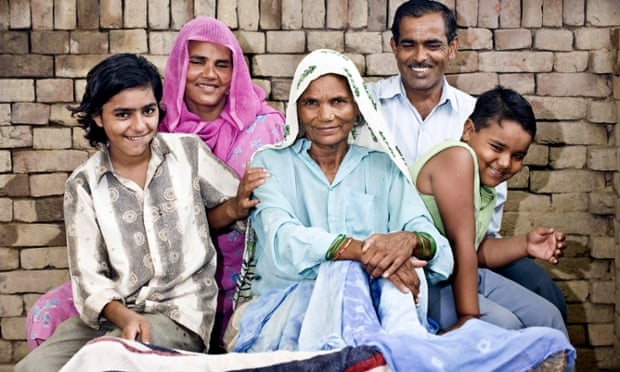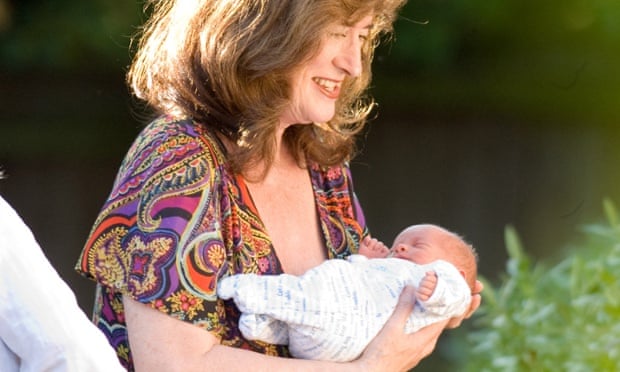
A 65-year-old German woman who is due to give birth to quadruplets in the summer has defended her decision and says she is looking forward to the challenges ahead.
Annegret Raunigk, who is in her fifth month of pregnancy, said she had decided to get pregnant after her nine-year-old daughter, Lelia, told her she would like a baby sister or brother. “She’s a great kid and I wanted to fulfil her wish,” Raunigk told the German television channel RTL.
She said she found it “quite a strain battling against the cliches” as to what she should and should not be capable of at her age, and if science had enabled her to get pregnant “it should be up to everyone to decide for themselves”.
Raunigk, who has 13 children and seven grandchildren, was open about the fact that her pregnancy was the result of artificial insemination carried out in a clinic in Ukraine using sperm and eggs from anonymous donors, a practice forbidden in Germany. All four of the fertilised eggs placed in Raunigk’s womb developed into embryos, contrary to her doctors’ expectations. The chance of quadruplets being conceived naturally is otherwise one in 13 million.
Raunigk, a Russian and English primary school teacher who is due to retire shortly before giving birth, did not reveal how many times she had gone through the IVF process or how much it had cost.
She made headlines nine years ago when she became Germany’s oldest mother at the age of 55 after giving birth to Lelia, who she said was conceived naturally. She then appeared on German television with her 13 children, the oldest of whom is now 43.
Apart from Lelia, none of her children have this time wished to share the limelight with their mother, who has again become a household name in Germany since news of her pregnancy came to light last week.
Raunigk, who lives in Berlin but plans to move to a town in North Rhine-Westphalia to be closer to some of her other children before the birth, will hope to finance her children’s upbringing through media coverage and sponsorship deals. She told the RTL show Extra: “I don’t interfere in anyone else’s life and I don’t expect them to interfere in mine.”
Lelia told the show’s host she had wanted her mother to have only one child. “So what shall we do with the others?” her mother joked during the interview.
Her daughter’s expression turned to one of alarm when she heard a doctor tell Raunigk that she was likely to be admitted to hospital soon to prevent premature labour. The quadruplets are due in August but are likely to be born sooner.

Raunigk, who has been married five times but has largely raised her children alone, said she could not imagine another man in her life to help her out. “My experiences with men were always that they were the wrong ones,” she said.
Asked if she had made provisions for her children’s future, particularly if she were to die or become incapacitated while they were still too young to care for themselves, she answered: “I will do so, I think.” She added that she had “always liked life with kids ... and the constant challenges it brings”.
The show’s host, Birgit Schrowange, asked off-camera whether or not Raunigk was egotistical or whether it was a case of “monumental mother love”? Viewers were invited to voice their views in a telephone poll.
Raunigk’s gynaecologist, while critical of the doctors in Ukraine who enabled the multiple pregnancy, said the 65-year-old’s “prevailing positive psychological mood” would contribute much to its outcome.
The world’s oldest mothers
• Omkari Panwar, from Uttar Pradesh in India, below, is believed to be the oldest woman to give birth. In June 2008 she gave birth to twins, a boy and a girl, when she was 70. The babies were conceived through IVF treatment with a single egg donor and sperm from her husband. There is, however, some debate about whether Panwar is the oldest woman to give birth as she does not have a birth certificate. She and her husband, Charan Singh Panwar, already had two daughters and five grandchildren but underwent the IVF treatment because they were desperate to have a son.

• Rajo Devi Lohan gave birth to a daughter, Naveen, in November 2008 when she was 69. The Indian woman conceived the baby using IVF treatment, with an egg donor and her 71 year-old husband’s sperm. Lohan nearly died due to complications after the birth.
• Maria del Carmen Bousada de Lara gave birth to twin boys, Pau and Christian, in Barcelona in December 2006, a week before her 67th birthday. The babies were conceived using both egg and sperm donors, through a fertility clinic in Los Angeles. The clinic, whose maximum age for IVF treatment is 55, said Bousada lied about her age to become pregnant. Bousada died in 2009 from cancer, which developed after giving birth, when her sons were two years old.
• In May 2010, Bhateri Devi, became at 66 the oldest woman in the world to give birth to triplets. The Indian woman had been unable to conceive a child with her husband until an IVF clinic in Haryana agreed to treat her.

• The oldest woman to give birth in Britain is Elizabeth Adeney, above, who gave birth to her son Jolyon, in Cambridge, when she was 66. The boy, who was born in May 2009, was conceived through IVF treatment in Ukraine, which involved both egg and sperm donation.
credit link: http://www.theguardian.com/world/2015/apr/14/65-year-old-german-woman-expecting-quadruplets-defends-pregnancy

